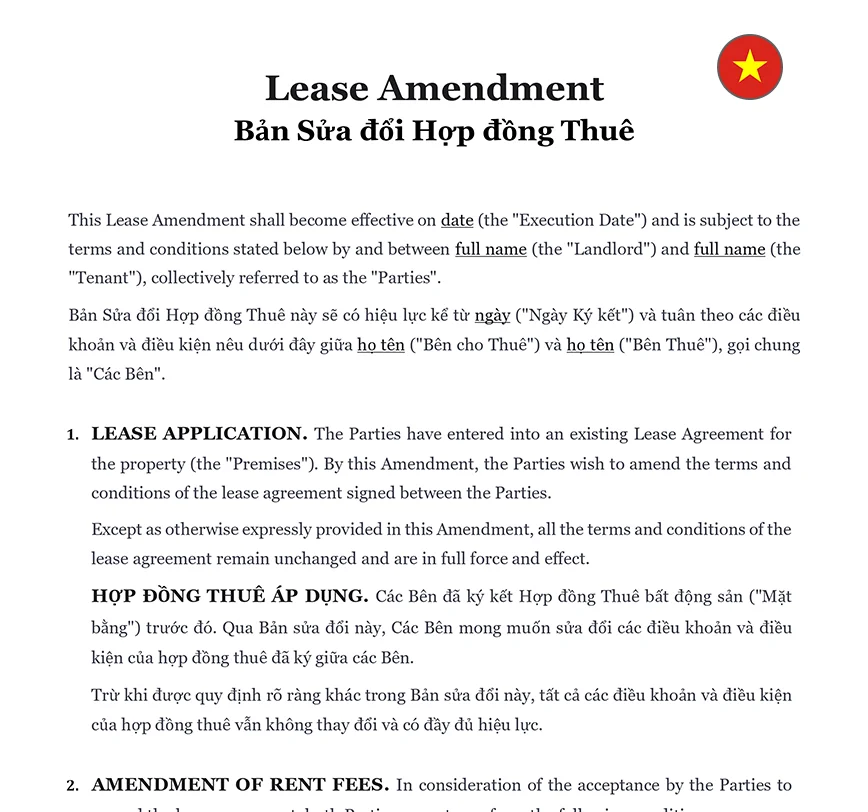Ready to use legal template
Drafted by experienced lawyers
Vietnamese-English translation
Ready to use legal template
Drafted by lawyers
Vietnamese-English translation
Home › Rent your property › Lease amendment
Learn more about Lease Amendment in Vietnam
A Lease Amendment is a legal document used to modify the terms of an existing Lease Agreement between a landlord and tenant. This document is used when both parties agree to alter the original lease terms, such as extending the lease duration, changing the rent amount, or adding/removing a Tenant to an existing Lease. Themis Partner provides a document template that had been meticulously crafted by our legal experts in Vietnam to ensure compliance with local laws. It is provided in an easy-to-edit Word format, allowing you to tailor it to your specific needs quickly and efficiently.
Table of contents
What is a Lease Amendment?
What is included in the Lease Amendment?
Why would I need to amend a Lease Agreement?
What types of changes can be made through a Lease Amendment?
Do both parties need to agree to a Lease Amendment?
What is the process for amending the Lease Agreement in Vietnam?
Are there any restrictions on amending the Lease Agreement in Vietnam?
Can a Lease Amendment be revoked or changed later?
What is a Lease Amendment?
A Lease Amendment is a legal document that serves to modify or add provisions to an existing lease agreement between a landlord and a tenant. This document is used when both parties agree to change specific terms of the original lease without creating an entirely new agreement. Lease Amendments are used to formalize changes such as rent increases, changes in lease duration, modifications to maintenance responsibilities, or updates to other terms and conditions.
To be legally binding, a Lease Amendment must be agreed upon and signed by both the landlord and the tenant. It should clearly outline the changes being made, reference the original lease agreement, and include any necessary legal language to ensure compliance with local laws and regulations. Using a lease amendment allows landlords and tenants to make changes to their lease agreements in a formal and documented manner, helping to avoid misunderstandings and disputes in the future.
What is included in a Lease Amendment?
A Lease Amendment includes the following elements:
1. Parties: Identifies the landlord and tenant involved in the lease agreement.
2. Reference to Original Lease: States the date and title of the original lease agreement being amended.
3. Amended Terms: Clearly specifies the changes or additions being made to the original lease agreement.
4. Effective Date: Specifies the date on which the amended terms will take effect.
5. Notarization: In some cases, the lease amendment may need to be notarized to be legally valid.
6. Severability Clause: States that if any part of the amendment is found to be invalid, the rest of the amendment remains in effect.
It’s important for a lease amendment to be clear, concise, and legally sound to avoid any misunderstandings or disputes between the landlord and tenant.
Why would I need to amend a Lease Agreement?
Amending a Lease Agreement allows both parties to formalize changes to the original agreement in a clear and documented manner, helping to avoid misunderstandings or disputes in the future. There are several reasons why you might need to amend a Lease Agreement:
| ➤ Change in Terms: If there is a need to change any terms of the original lease, such as rent amount, lease duration, or maintenance responsibilities. |
| ➤ Addition of Terms: If you want to add new terms or provisions to the lease agreement, such as pet policies or rules regarding subletting. |
| ➤ Clarification: If there is ambiguity or uncertainty in the original lease that needs to be clarified. |
| ➤ Renewal or Extension: If both parties agree to renew or extend the lease term beyond the original agreement. |
| ➤ Changes in Circumstances: If there are changes in circumstances that require adjustments to the lease, such as changes in occupancy or use of the property. |
| ➤ Legal Compliance: If there are changes in local laws or regulations that require modifications to the lease agreement. |
| ➤ Mutual Agreement: If both parties agree to make changes to the lease for any reason. |




